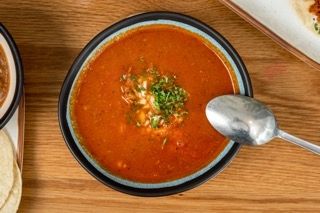Taste authenticity in every dish served at New York Times rated dining venues
Is Mexican Food Healthy And Balanced? Unboxing the Nutritional Perks of Standard Components
The inquiry of whether Mexican food is healthy and balanced invites an exploration of its conventional components. Beans and corn act as fundamental staples, rich in protein and fiber. Avocados give valuable fats, while numerous herbs and spices add flavor and wellness benefits - lunch and dinner. With each other, these components develop a tapestry of nutrition. Nevertheless, the healthiness of Mexican cuisine usually depends upon prep work methods and part dimensions. What duty do these factors play in determining its total dietary value?
The Power of Beans: Protein and Fiber-Rich Staples
Although often neglected, beans work as a keystone of Mexican food, providing a wide range of dietary advantages. Rich in healthy protein, they are an excellent plant-based alternative for those seeking to fulfill their dietary protein needs. This high protein material supports muscle mass repair service and growth, making beans vital for both vegetarians and meat-eaters alike. Additionally, beans are an extraordinary source of dietary fiber, which aids in digestion and promotes a sensation of volume, possibly aiding with weight administration.
The variety of beans utilized in Mexican dishes, such as black beans, pinto beans, and kidney beans, adds to a varied taste account and can boost dishes nutritionally. In addition, beans are reduced in fat and have essential vitamins and minerals, including iron, magnesium, and folate. Together, these attributes make beans an essential ingredient, delivering both nourishment and sustenance in traditional Mexican price.

Corn: a Versatile Grain With Nutritional Perks
Corn stands apart as a versatile grain basic to Mexican cuisine, celebrated not only for its culinary applications but also for its outstanding nutritional account. As a main component in recipes like tortillas, tamales, and pozole, corn supplies essential nutrients that add to a balanced diet regimen. Rich in carbs, it acts as a significant energy resource, while also being reduced in fat, making it a beneficial option for various nutritional demands.
Additionally, corn is a good source of nutritional fiber, which aids in food digestion and promotes satiation. It consists of significant amounts of vitamins such as B-complex vitamins, which are essential for basal metabolism. The visibility of anti-oxidants, especially carotenoids, adds to total wellness by reducing oxidative tension. Furthermore, corn is gluten-free, accommodating those with gluten sensitivities. In general, the nutritional benefits of corn underscore its value in typical Mexican food and its duty in a healthy diet.
Avocados: Healthy Fats and Nutrients in Every Bite
Avocados play a considerable role in Mexican cuisine, complementing recipes with their luscious appearance and abundant flavor. Beyond their culinary appeal, avocados are commemorated for their impressive nutritional account. They are an abundant resource of healthy monounsaturated fats, which can assist lower bad cholesterol levels and support heart health. In addition, avocados are loaded with crucial vitamins and minerals, including potassium, vitamin E, and B vitamins, contributing to total health.
The high fiber web content in avocados help digestion and promotes satiation, making them an advantageous addition to any meal. Their unique nutrient make-up can additionally sustain skin health and provide anti-inflammatory benefits. Incorporating avocados into standard Mexican meals or appreciating them as a standalone treat can boost both flavor and nutrition, showing why they are a beloved staple in Mexican food. In general, avocados offer a scrumptious way to appreciate healthy and delmonico steak balanced fats and important nutrients in every bite.
Spices and Natural Herbs: Flavorful Health And Wellness Boosters
While appreciating the rich flavors of Mexican food, one can not overlook the necessary duty that spices and herbs play in improving both taste and health and wellness. Active ingredients such as chili, cilantro, and oregano peppers not only add to the vibrant flavor account however also supply substantial health and wellness benefits. Cilantro is known for its detoxifying residential properties, assisting to get rid of heavy steels from the body, while oregano is packed with antioxidants and possesses anti-inflammatory effects.
Chili peppers, a staple in numerous Mexican meals, consist of capsaicin, which has actually been connected to boosted metabolism and pain relief. In addition, seasonings like cumin and coriander assistance food digestion and might help in blood glucose policy. Incorporating these flavorful health boosters right into dishes not just improves the culinary experience yet additionally advertises overall well-being, making Mexican food not simply tasty, however also nutritionally beneficial.
Conventional Cooking Approaches: Enhancing Nourishment and Taste
Standard food preparation methods in Mexican food play an important function in improving both nutrition and use this link flavor, as they usually focus on fresh components and time-honored methods. Methods such as nixtamalization, where corn is soaked and cooked in an alkaline option, not just boost the nutrient account of tortillas however additionally boost their digestibility - tacos. Additionally, making use of slow cooking approaches, like cooking or braising, permits flavors to fuse magnificently while maintaining the stability of the ingredients

Regularly Asked Inquiries
Are Mexican Food Portions Normally Larger Than Other Cuisines?
Mexican food sections are typically larger than those of several various other cuisines. This characteristic reflects typical eating methods, emphasizing public sharing and hearty meals, which can bring about a much more substantial offering size on the whole.
Exactly how Does the Preparation Approach Affect Healthiness of Mexican Food?
Prep work techniques considerably influence the healthfulness of Mexican food. Techniques such as cooking or steaming maintain nutrients, while frying can raise harmful fat web content. Options of active ingredients and cooking styles ultimately figure out general nutritional value.
Can Mexican Food Be Customized for Certain Nutritional Restrictions?
Mexican food can indeed be customized for particular nutritional constraints. Replacements, such as utilizing corn tortillas Look At This for gluten-free diets or incorporating even more vegetables, enable people to take pleasure in conventional tastes while fitting various nutritional needs.
What Prevail False Impressions Regarding Mexican Food and Wellness?
Typical false impressions regarding Mexican food consist of the idea that it is inherently undesirable, extremely hot, and only concentrated on fats. In truth, typical dishes typically include nutritious components and can be tailored to numerous nutritional needs.
Are There Much Healthier Alternatives at Mexican Restaurants?
Healthier options at Mexican dining establishments often include barbequed meats, beans, and fresh vegetables. Selecting meals that stress entire ingredients and preventing heavy sauces can cause an extra nutritious dining experience, promoting total wellness.
The range of beans made use of in Mexican recipes, such as black beans, pinto beans, and kidney beans, adds to a varied taste account and can boost dishes nutritionally. Avocados play a substantial duty in Mexican food, enhancing dishes with their velvety texture and abundant flavor. Incorporating avocados into traditional Mexican recipes or appreciating them as a standalone treat can enhance both flavor and nourishment, showing why they are a cherished staple in Mexican cuisine. While delighting in the rich tastes of Mexican food, one can not neglect the vital role that spices and herbs play in boosting both taste and health. Typical food preparation techniques in Mexican cuisine play an essential duty in improving both nutrition and taste, as they typically prioritize classic methods and fresh ingredients.